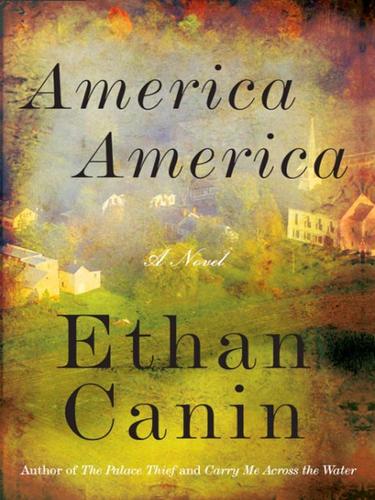
America America
A Novel
کتاب های مرتبط
- اطلاعات
- نقد و بررسی
- دیدگاه کاربران
نقد و بررسی

April 21, 2008
Signature
Reviewed by
Jerome Charyn
Ethan Canin's new novel is a powerful lament that haunts us like a latter-day ghost of The Great Gatsby
. Like Gatsby, it deals with an orgiastic rupture in the American dream. If F. Scott Fitzgerald anatomized the Jazz Age and delivered its own corrupt and luscious poetry, Canin gives us a poisoned lullaby of the Nixon era. Canin's narrator, Corey Sifter, is a kind of Nick Carraway (but with working-class origins), who finds his way into the land of the rich. Corey is 16 in 1971; he lives in a little town in western New York State that used to belong to the Erie and Seneca Indians, but is now ruled by Liam Metarey, a tycoon of Scottish descent whose holdings cover a third of the county.
Liam is a very complicated man. Riddled with guilt over his father's rapacious gathering of wealth, he longs, like some benevolent laird, to reverse America's politics of greed. He sets about creating his own president, Henry Bonwiller, a United States senator from New York who is a champion of the working man and wants to get America out of Vietnam. He also “adopts” Corey, the son of a plumber and sidewalk contractor who “always smelled of lime.” Corey becomes a caretaker of Liam's grounds and mingles with his dysfunctional family. The Metareys, he tells us, “lived all year on their estate and we lived on land that had once been their horse pastures.”
Corey soon becomes involved in Bonwiller's presidential campaign. But Bonwiller is a deeply flawed candidate—a megalomaniac, a drunkard and a philanderer. He has a fling with a local beauty pageant queen, JoEllen Charney, who is a younger replica of his wife. And a little before the Iowa caucuses, JoEllen is found dead, “encased in ice in an apple orchard.” Bonwiller abandoned her during a car accident, but it's never made clear how she died. The entire novel seems to take place “behind a window of warped black glass.”
This is the great strength of the writing. The language is often supple, can leap from impressionistic poetry to a coroner's report, and can whiplash through time, from the 1970s to 2006, when Corey has become the publisher of a small independent newspaper and is married to one of Liam's daughters. Like Nick Carraway, Corey isn't always a reliable narrator: we have to trust his own imaginings about JoEllen and the coverup surrounding her death. Yet he too lurks behind that window of black glass. His own intern, Trieste Millbury, a high school student who lives in a trailer, realizes how Corey has fallen into the myth of the Metareys and blinded himself to their own blinding power. But together Trieste and Corey form a marvelous chorus, commenting upon and reliving the splintered action of this splendid novel.
Jerome Charyn's most recent novel,
Johnny One-Eye: A Tale of the American Revolution, was published by Norton.

Starred review from July 15, 2008
Canin's new work about class, politics, money, and media in the Nixon era through the present day will resonate powerfully with readers in this presidential election year. Corey Sifter, a working-class boy from a small New York town, is hired by the Metareys, the wealthiest family in Saline, to be a man-of-all-trades. His work ethic endears him to the Metareys, who treat him as one of the family, even paying for his prep school tuition. As both an insider and an outsider, Corey is in a unique position to observe the political maneuverings of Liam Metarey and his campaign to elect Sen. Henry Bonwiller to the presidency. However, Bonwiller's personal failings ruin not only his political career but also the finances and family life of the Metareys. This saga of politics and family is a superb achievement; Canin ("The Palace Thief") interleaves past and present to create a classical tragedy from the very first page. This engrossing novel would be a good book club selection and is highly recommended. [See Prepub Alert, "LJ" 2/1/08.]Amy Ford, St. Mary's Cty. Lib., Lexington Park, MD
Copyright 2008 Library Journal, LLC Used with permission.

May 1, 2008
The third volume of the authors celebrated and eagerly anticipated Wyoming stories (thefirst volume contained the now-famousnovella Brokeback Mountain, upon which the honored movie was based) takes giant steps toward securing Proulxs position as one of the most inventive yet, at the same time, traditional story writers working today. Borne on smooth, effortless prose, which glides easily into glorious metaphor, her fiction can as easily transport the agreeable reader to the Wyoming of 1885 as to, in two curious, amusing stories, the Devils lair in Hell, where he attempts to keep up withmodern times (in Ive Always Loved This Place, he is redecorating the underworld; in Swamp Mischief, he is fiddling with peoples e-mail). But, of course, it is the American West of past and present that we most desire Proulx to bring us honest tales of gritty characters, the harsh environment, and domestic dramas set against the hard labor and small earnings of the Wyoming cowboy.This new collectionwill not disappointon that front. For instance, Them Old Cowboy Songs, about the fateful homesteading ventures of young couple Archie and Rose, goes beyond poignancy to be a sheerly devastating story.The Great Divide chronicles another youngcouples struggleswith the decliningeconomy between1920 and 1940.Its difficult to label these stories ashistorical fiction, for they breathe such contemporaryair. They are timeless in their depicted tragedies.(Reprinted with permission of Booklist, copyright 2008, American Library Association.)

























دیدگاه کاربران